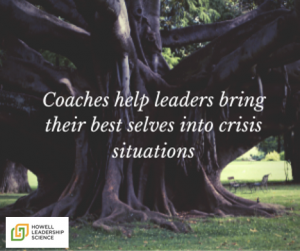Leadership coaching stabilizes and focuses leaders

June 2020 finds us in a time of deep unrest due to the ongoing pandemic, stay at home protocols and issues of police brutality and racial bias. It is a tough time for everyone.
Leaders in organizations find themselves torn in many directions as they juggle their work teams, families and themselves.
Some leaders will feel overwhelmed, helpless and even hopeless at times.
Who do they rely on for help and support? Where is their safety net?
Coaches can help.

Coaches provide support for leaders facing unprecedented decisions or who stumble in the new reality. Leadership coaches can support those leaders as they make decisions, communicate to their teams and work to keep their organizations solvent.
How can coaches be a safety net for leaders?
Coaches don’t solve problems for their clients. Instead they provide support that enables the client to perform well and lead others. Clients know how to do their jobs, but sometimes they need help to clear the way.
Case Study – The Angry Leader

A few years ago, I coached a leader dealing with an urgent and ugly issue with a direct report. The situation required immediate action including an emotional termination and then follow-up conversations with impacted team members.
The leader reached out to me prior to the termination for a short, impromptu coaching session. He was upset and angry to the point of shaking.
Entering the termination meeting while angry would have made a bad situation worse. After some powerful questions, the leader centered himself and focused on his core values of fairness and kindness.
With this perspective, he entered the conversation calmly, did what was needed and successfully led the team through the situation. That leader knew what he needed to do and already had the right leadership values.
He simply needed a coach to guide him back to his purpose when his own emotions had taken over.
Coaching services during a crisis

Most leaders have the skills and knowledge they need to be successful. Even with their challenges, they could probably find solutions by reading books, watching TED Talks and talking to colleagues.
Coaches accelerate the development process and cut through the need for the leader to hunt for information and ramp up on their own.
Coaches act as a mirror during times of crisis to reflect ideal responses and offer a shortcut to higher performance.
Engagements might look different than typical ones and could include some of these topics:
Sounding board
Coaches act as a sounding board for many leaders. Many senior leaders do not have anyone in the workplace that they can talk to openly and often do not want to burden family members.
Coaches provide a confidential safe space to discuss frustrations and fears, explore challenges or consider actions.
Manage anxiety
Leaders face heightened anxiety in times of crisis as they make job-related decisions, manage other people and try to keep the business running.
Coaches can help with stress management and tactics for controlling anxiety. If the anxiety is too high, the coach can refer to a therapist.
Set goals
When everything is unsettled, it is hard to re-prioritize and set new goals.
Coaches can help leaders think through various needs and prioritize work projects.
It can also mean re-setting leadership intentions such as remembering to lead with kindness and patience.
Communication

Words matter – especially in times of crisis.
Leaders communicate in one on one conversations, team meetings, Board and stakeholder reports and written messages.
Working with a coach can help a leader clarify the intended message, find the right words and prepare for tough discussions. Preparation avoids confusion and manages emotional reactions.
Interpersonal
The need to make tough decisions fast and with imperfect information can lead to interpersonal issues.
Senior leaders might disagree and get angry with each other. Home stress will cause some direct reports to become upset or hostile. Customers and suppliers might complain and demand answers.
Working with a coach, leaders can discuss relationship issues and identify the best approach for managing disagreements and stabilizing relationships.
How would it work?

A coaching engagement might look different during a crisis. In normal times, leadership coaching engagements often span 6-12 months and involve a formal on boarding process.
During a crisis, the engagement might involve more just-in-time coaching with frequent, short sessions to get through a tough spot. Similar to the situation described above, the leader might reach out before a tough conversation or touch base once a week to cover current topics.
The focus will involve immediate issues versus longer term career and development goals.
Due to the time sensitivity and travel restrictions, the sessions are likely to be phone calls or Zoom meetings and might not involve assessments.
Most coaches will offer support by asking powerful questions, listening deeply and helping the leader find their own path.
During a crisis, a coach keeps leaders mentally sharp, clear headed and focused, so they can lead your organization to a stronger future.
Find more information about leadership coaching at my website Howell Leadership Science, International Coach Federation and the American Psychological Association Society of Consulting Psychology.



